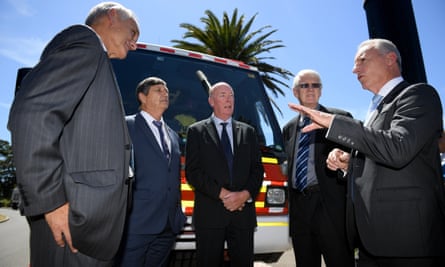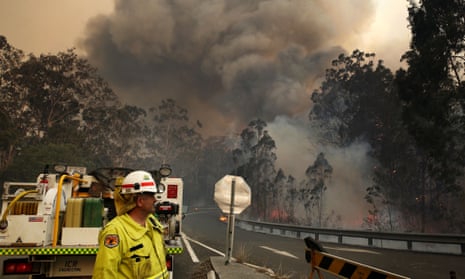A coalition of former fire chiefs have said the government “fundamentally doesn’t like talking about climate change” and that politics is the reason the government was ignoring their advice.
Former heads of the New South Wales, Queensland, Victorian and Tasmanian fire services met in Sydney on Thursday after fires that killed four people tore through the the Australian east coast this week.
They said the climate crisis was making bushfires deadlier and bushfire season longer, and the federal government needed to act immediately.
“Just a 1C temperature rise has meant the extremes are far more extreme, and it is placing lives at risk, including firefighters,” said Greg Mullins, the former chief of NSW Fire and Rescue. “Climate change has supercharged the bushfire problem.”
“Bushfires are a symptom of climate change,” said Neil Bibby, the former chief executive of Victoria’s Country Fire Authority.
“Firefighters are the immune system that gets rid of that symptom. But [the problem is] still there.”
Mullins said he and 23 other fire and emergency chiefs had been trying to have a meeting with the prime minister, Scott Morrison, since April because they “knew that a bushfire crisis was coming”.
Instead, he said current fire chiefs had been locked out of discussions and were “not allowed” to mention climate change.

“This government fundamentally doesn’t like talking about climate change,” Mullins said. “We would like the doors to be open to the current chiefs, and allow them to utter the words ‘climate change’. They are not allowed to at the moment.
“The Grenfell fire in London, people talked about the cause from day one. Train crashes they talk from day one. And it is OK to say it is an arsonist’s fault, or pretend that the greenies are stopping hazard reduction burning, which is simply not true.
“But you are not allowed to talk about climate change. Well, we are, because we know what is happening.”
Bibby, who was in charge during Victoria’s Black Saturday, said politics was the reason the government was ignoring the former fire chiefs’ advice.
Other interstate fire chiefs were outspoken about the effect global heating has on bushfires.
Lee Johnson, the former commissioner of Queensland Fire and Emergency Services wanted immediate action.
“I’m here for my children and grandchildren,” he said. “In Queensland in the last couple of weeks we have seen unprecedented fires.”
Bob Conroy, former fire manager of NSW National Parks and Wildlife Service, said: “The fires are impacting on areas that haven’t known fires for millennia.”
Mullins said the bushfire emergency was underlaid by a climate emergency.
“On the 6th of September, southeast Queensland and NSW experienced record fire weather, never before experienced in September. On the 8th of November, again we had record-breaking fire weather in NSW.
“And on the 12th of November, for the first time ever, Sydney experienced catastrophic fire danger. Fires are literally off the scale on this warming planet.”
The link between climate change and bushfire risk became a political flashpoint this week.
On Monday the Nationals leader and deputy prime minister, Michael McCormack, said it galled him when “inner-city lefties” raised climate change in relation to bushfires.
“We’ve had fires in Australia since time began, and what people need now is a little bit of sympathy, understanding and real assistance – they need help, they need shelter,” he told ABC Radio.
“They don’t need the ravings of some pure, enlightened and woke capital city greenies at this time, when they’re trying to save their homes, when in fact they’re going out in many cases saving other peoples’ homes and leaving their own homes at risk.”
The NSW Nationals leader, John Barilaro, said it was “a disgrace” for anyone to talk about climate change during the bushfires.
But on Wednesday the Liberal MP and NSW environment minister, Matt Kean, said climate change “is a real issue” and “requires a decisive response”. He said science was clear that “our changing climate is seeing more extreme weather events”.
In an escalating political debate, Greens senator Jordon Steele-John branded major party politicians “arsonists” for supporting the coal industry.
“You are no better than a bunch of arsonists – borderline arsonists – and you should be ashamed,” he told the Senate.
The former fire chiefs had two requests for the government: more resources for firefighters; take on “the fundamental problem” of climate change.
Mullins said he was told the energy minister, Angus Taylor, would speak to him and the water minister, David Littleproud, has set a meeting.
“None of us can understand why climate change in Australia is so political,” he said. “In the UK, the conservatives, Margaret Thatcher, said years ago this is a major problem.”
